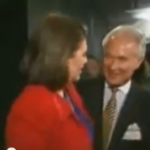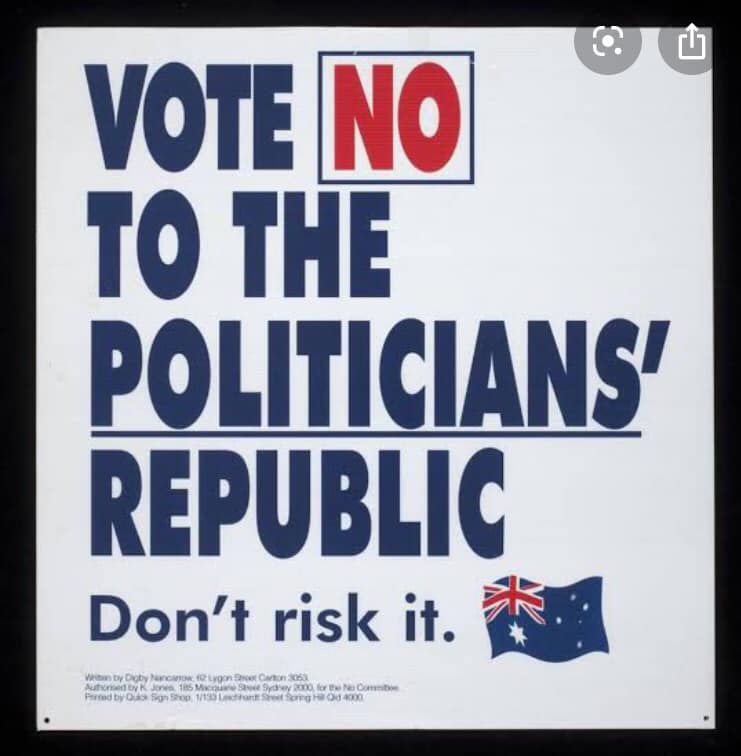Crowned Republic v Politicians Republic
The word ‘republic ‘is not precise and it can be misleading. Indeed, when our founders proposed that the Australian colonies be united in an indissoluble Federal Commonwealth, they reported that the only objections were that the word ‘Commonwealth‘ was suggestive of republicanism. Nevertheless, it prevailed, no doubt because it never precluded monarchy.
It is no surprise, then, that many leading monarchists, including both our most monarchical 25th and 28th Prime Ministers, John Howard and Tony Abbott, affirm that Australia is already a republic ─ a crowned republic.
The Charter of Australians for Constitutional Monarchy, the organization which led the campaign for the NO Case in the referendum, states that “Some of us believe that Australia is already a form of republic under the Crown: a ‘crowned republic’. Australia now enjoys all the desirable features of a republican government and a constitutional monarchy without any disadvantages of either system. “.
The Charter adds that ‘’…agitation for change is unnecessary, irrelevant, divisive and distracting.”
While the official republican movement. the ARM claims the issue is between a constitutional monarchy and a republic, the true question is whether we are to stay with the long-term successful working of the Westminster system, or whether we are to politicise every part of our constitution in a ‘politicians republic’, that extremely effective term conceived by ACM during the referendum campaign.
Among Australia’s current so-called republicans, none promotes the real alternative to our system, the American-style presidential republic. This aims to achieve the checks and balances on power the British do, but through a strict separation of legislative, executive, and judicial powers divided federally.

In many ways, the American republic and our crowned republic have common origins. The philosopher who most influenced the Americans, John Locke, lavishly praised England’s Glorious Revolution which established the first stage of our constitutional monarchy as protecting the natural rights of its people, namely life, liberty, and property. You can almost hear the Declaration of Independence.
But instead of proposing a real republic for consideration, Australia’s so-called republicans try to graft an aberration onto our constitution, a politicians’ republic in which the powers status and privilege of an increasingly isolated elite political class will be even more concentrated.
The latest fails in its aim to unite ‘direct-elect’ Real Republicans and the ARM. It recalls the guided democracies of semi-dictatorships where politicians will do deals to select a list of other politicians from which the ordinary Australians will be allowed to select one to do the bidding of the politicians. Just to make sure he does that, his office will be stripped of the reserve powers that any conscientious governor-general uses discreetly to fulfill his or her role as a constitutional guardian
In the meantime, in selling these low-quality politicians republic, the ARM has long been duplicitous in inventing reasons to justify this momentous change.

.
We were told, for example, that this would improve immigration and that it would make the Indonesians and the French understand Australia. Perhaps the most ridiculous was that announced by former federal politician Al Grasby who blamed the Crown for the rate of unemployment.
The principal reason they now argue is that only in a politicians republic can we have an Australian as head of state.
ACM argued from before the referendum, supported by expert advice, that the Queen is sovereign and the Governor-General is head of state. We have long rejected the falsity proposed by the republicans and supported strongly for the better part of two wasted decades by uninformed royalists that the Queen is head of state. Notwithstanding the massive propaganda for a politicians’ republic during the referendum, with the ARM attacking the ACM for “ not mentioning the Queen’’, we have always said the fundamental argument was institutional.
In intensive research first published in 2012, Why National Fail: The Origins of Power, Prosperity, and Poverty, two leading American- based economics professors, Daron Acemoglu and James Robinson, demonstrated that the main reasons for differences in the economic and social development of different states are not such factors as geography, climate ,genetics, culture, religion, or even resources . The main reasons are a nation’s political and economic institutions.
This can be seen in the two Koreas and in a comparison of Argentina and Australia ,which were at the time of our Federation, the two richest countries per capita in the world. Now Argentina has a per capita GDP about that of half of Australia. Much of this must relate to the collapse of Argentina’s institutions.
During a debate at an inner city elite Liberal Party branch well before the referendum, I declared that on the whole constitutional monarchies were proportionately far more successful and freer than republics. This I was greeted by screams of outrage from republican supporters. They soon quietened when I merely recited the names of what are generally agreed to be the world’s most advanced free and civilised countries which are, disproportionately, constitutional monarchies.
So we regularly produced information which demonstrated this.
Whatever we think of governance today, the one part of our constitutional system which continues to work well, efficiently and at minimal cost is the Australian Crown. Under this, the Queen of Australia is sovereign and the governor-general is the head of state and he or she has long been an Australian.
This is ‘head of state’ without any unnecessary qualification. Putting in some qualification suggests, without any justification, that he or she is not really the head of state.
The term is used in two ways. First as a description of a domestic constitutional office and not its formal name. This has been the practice since an early High Court consisting of founders unanimously adopted this approach in 1907. The second way the term is used is as a specific legal office recognized under international law. Here again, the governor-general is the Australian Head of State.
There is much to be concerned about in the system of governance in Australia today. If the voters in 1999 were wary about anything it is surely best expressed in Acton’s warning: Power tends to corrupt and absolute power corrupts absolutely.
[David Flint, Family World News July 2022]
